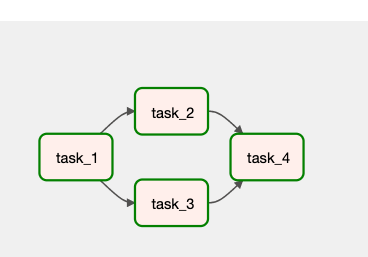if each task is depended on the value from previous task you can achieve it by:
from airflow.utils.dates import days_ago
from airflow.decorators import task, dag
@task
def task_1():
return 'first task'
@task
def task_2(value):
return 'second task'
@task
def task_3(value):
return 'third task'
@task
def task_4(value1, value2):
return 'forth task'
default_args = {
'owner': 'airflow',
'start_date': days_ago(2),
}
@dag(dag_id='taskflow_stackoverflow', schedule_interval='@once', default_args=default_args, catchup=False)
def my_dag():
op_1 = task_1()
op_2 = task_2(op_1)
op_3 = task_3(op_1)
op_4 = task_4(op_2, op_3)
dag = my_dag()
![enter image description here]()
The syntax that you mentioned is also supported but you won't get direct access to the xcom values from previous tasks:
@task
def task_1():
return 'first task'
@task
def task_2():
return 'second task'
@task
def task_3():
return 'third task'
@task
def task_4():
return 'forth task'
default_args = {
'owner': 'airflow',
'start_date': days_ago(2),
}
@dag(dag_id='taskflow_stackoverflow', schedule_interval='@once', default_args=default_args, catchup=False)
def my_dag():
op_1 = task_1()
op_2 = task_2()
op_3 = task_3()
op_4 = task_4()
op_1 >> [op_2, op_3]
[op_2, op_3] >> op_4
dag = my_dag()
Probably you need to mix the two options of syntax depending on what you want to achieve.

